discomfort support
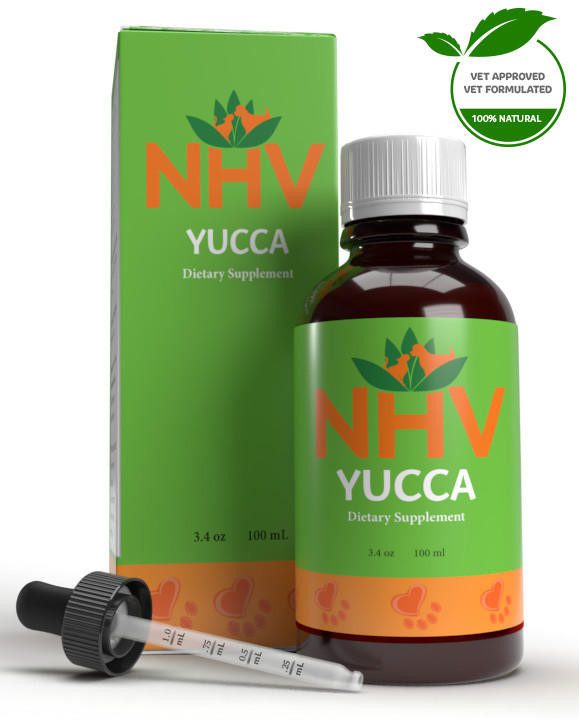
free shipping over $100 (USA & Canada)
1-877-937-4372 the pet expert hotline
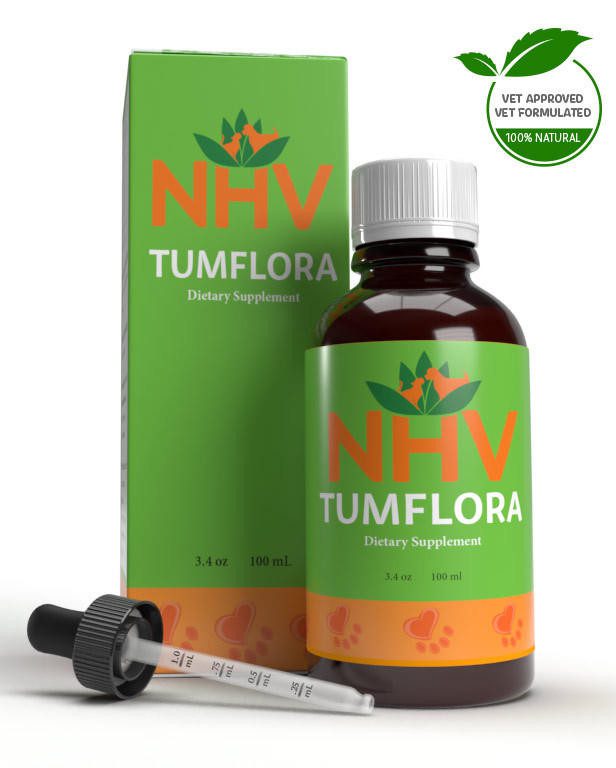
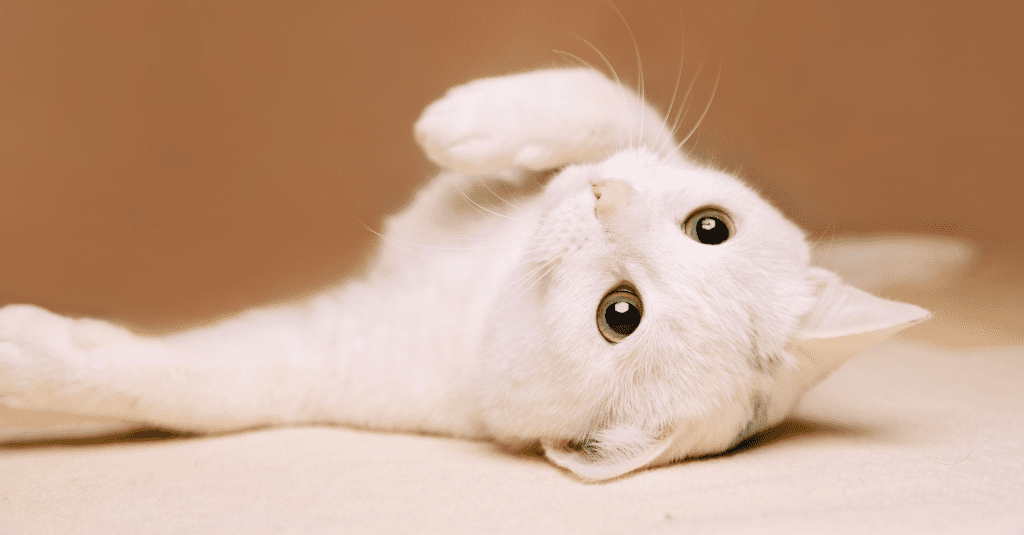
What if we told you that E. coli in dogs and cats is entirely normal? There’s usually no need to panic, as this bacteria is typically benign and lives in harmony inside your little one’s gut. However, when highly concentrated, it can cause an E. coli infection. And this can be deadly, especially in young pets!
All warm-blooded animals, including dogs and cats, have many microbes living peacefully inside their intestine. One of the most famous “good bacteria” we hear about is probiotics. But did you know that E. coli is also one of them?
One of the most famous “good bacteria” we hear about is probiotics. But did you know that E. coli is also one of them?
A high quantity of Escherichia coli or E. coli in your little one’s system can cause severe infections. An E. coli infection can lead to symptoms from simple diarrhea to severe kidney infection, meningitis, or blood poisoning (septicemia), which can lead to death.
These are some of the most common signs of infection caused by excess E. coli in dogs and cats to keep your eye for:
These symptoms can go away when treated with proper medications, like antibiotics, anti-emetics, fluid therapy, and a nutritious diet. The scary part is that Escherichia coli can be highly resistant to multiple pharmaceuticals, so in more severe cases, the pet might require 24/7 monitoring in a veterinary hospital.
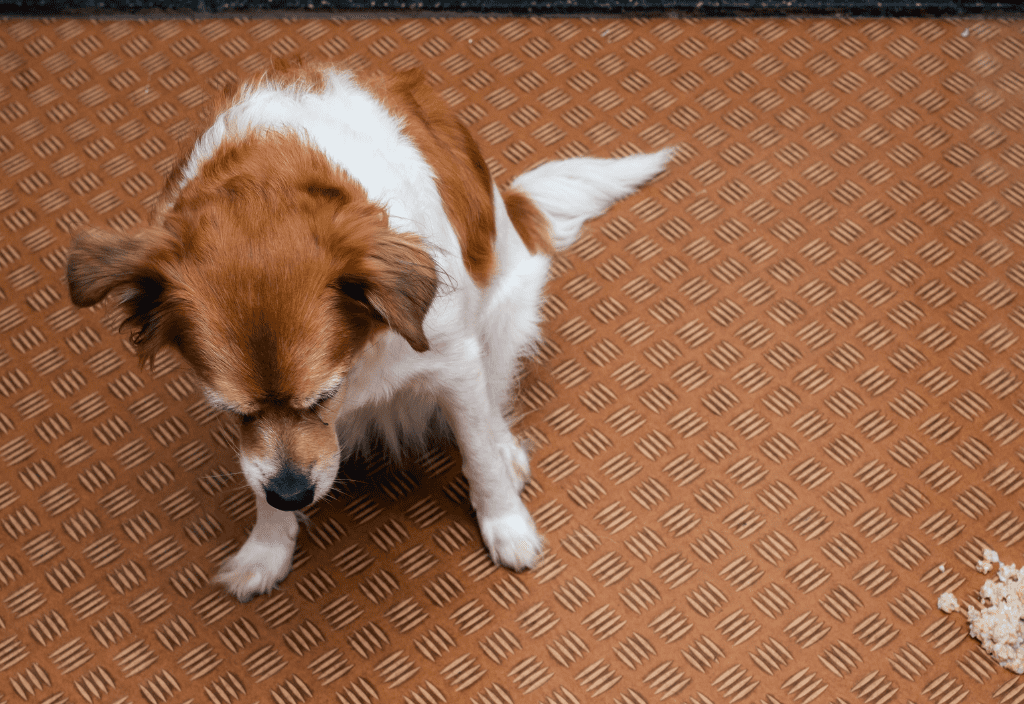
More severe cases will require an extended stay at the vet, but in general, once the pet is eating by themselves and most symptoms have subsided, the owner can take them home. Once your little one is back under your care, make sure to provide them with lots of warmth, good food, nutritional support, and extra love.
Rest, restricted activity, and close monitoring as your little one recovers are also essential in managing E. coli in dogs and cats.
At NHV we have natural supplements that can offer extra support during your little one’s recovery time. NHV Probiotics + Prebiotics helps support your pet’s digestive system and ease symptoms of E. coli infection like diarrhea. Herbal formulas like NHV Plantaeris and NHV TumFlora can help with gastrointestinal symptoms like diarrhea, GI inflammation, and poor absorption of nutrients.
NHV Yucca is also a great added aid for its discomfort-relieving properties. This extract can also help with inflammation, nausea, and lack of appetite.
NHV Inulin-PK was formulated to help eliminate harmful parasites while stimulating healing in the gastrointestinal tract.
Finally, NHV Felimm is our main recommendation for pets fighting against any bacterial infection. It contains herbs with antiseptic, antibacterial, antiviral, and anti-inflammatory qualities that offer support against a variety of conditions.
It is impossible to avoid contact with this bacteria since it lives inside your little one’s gut. But the excess of E. coli in dogs and cats is caused by the ingestion of contaminated food. So keeping the environment where your furkiddo lives clean is essential.
Here are some tips on adequate sanitation:
E. coli infection can progress really quickly into something very serious if left untreated. So remember, when in doubt, talk to your veterinarian. We are also always here to help you and your furkiddo on the path of recovery.
discomfort support

Discomfort Relief, Digestive Support, and Dog Appetite Booster
buy 2 and save $3
3 month supply for a small to medium size
Yucca for dogs is an all-natural supplement that can be helpful in many circumstances by providing symptom relief related to inflammation, discomfort, and loss of appetite.


Yucca for dogs is an all-natural supplement that can be helpful in many circumstances by providing symptom relief related to inflammation, discomfort, and loss of appetite.

Yucca root is widely used in dog food as well as in other pet foods. It is an herb that is highly nutritive as it is rich in vitamin C, beta-carotene, B vitamins, magnesium, iron, calcium, manganese, protein, niacin, and phosphorus. Yucca contains two very beneficial compounds: sarsasapogenin and smilagenin. These two compounds work on the mucous membranes of the small intestine. These compounds help with the penetration and absorption of minerals and vitamins. Sarsasapogenin and Smilagenin are known as steroidal saponins (phytosterols), which act as precursors to corticosteroids produced naturally by the body.
Steroidal-saponins support the immune function of the body while stimulating and supporting the production of its own corticosteroids and corticosteroid–related hormones. Due to this action, studies conducted on yucca have shown that it may be beneficial and effective for discomfort and inflammation in conditions such as arthritis. Yucca may also be effective as an appetite booster in dogs and may also help reduce the production of urease, which contributes to the unpleasant odors of urine and feces in some dogs.
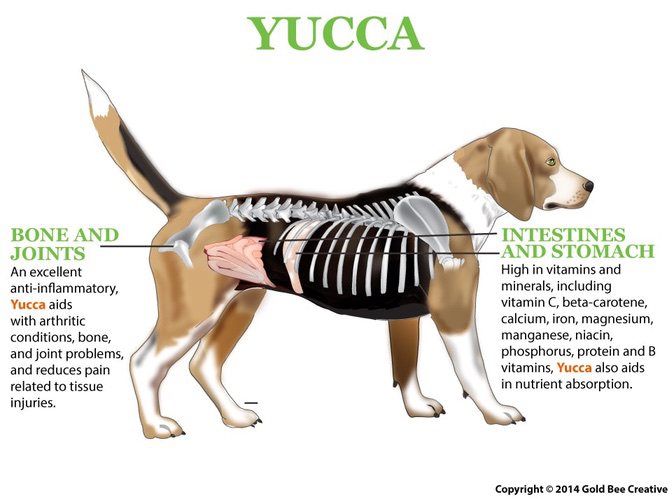
Yucca for dogs is commonly used for supporting arthritis, as an anti-inflammatory, nutritive, antitumor, and digestive. Yucca for dogs is considered a nutritive herb because it is rich in vitamins and minerals like vitamin C, beta-carotene, B vitamins, magnesium, iron, calcium, manganese, protein, niacin, and phosphorus.
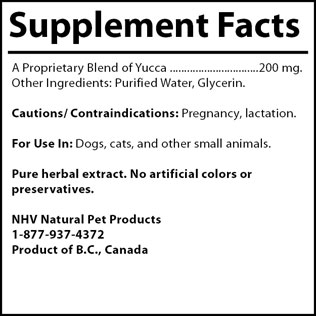
Select your pet's weight to determine the correct dose.
To be taken twice daily. Determine your pet’s weight and then use the easy chart below to determine the correct dose. This is the minimum dosage.
Pet's Weight Dosage
0 - 15 lb = 0.5 ml
16 - 30 lb = 1.0 ml
31 - 45 lb = 1.5 ml
46 - 60 lb = 2.0 ml
61 - 75 lb = 2.5 ml
Over 75 lb = 3.0 ml
How to Administer: Shake well before use. The easiest method is to use the dropper provided and place the drops into your pet’s food or favorite treat. You can also use the dropper and squirt directly into the pet’s mouth. Some pets can be finicky, if this occurs consider hiding the drops in foods most pet’s love such as fish, chicken or yogurt or a favorite treat. If your pet only eats dry food then soak a few kibbles at feeding time.
For Best Results: Herbal dietary supplements are beneficial to the health and well-being of your pet and are safe for long-term use. Every pet responds to natural herbal supplements differently, therefore it is important to be consistent and administer the product daily. Supplements generally take two to four weeks to take effect, however this will vary from one animal to the next.
Product Storage: All NHV Natural Pet Products are pure herbal extracts and contain no artificial additives, preservatives or coloring. Shelf life after opening is 6 months and must be refrigerated after opening.
Cautions and Contraindications: Do not use Yucca in pregnant or nursing animals. Speak to your vet before using our products. A second visit is recommended if your pet’s condition does not improve, or deteriorates after continued use of the supplements. All information provided by NHV Natural Pet Products is for educational purposes only.
Yucca root is widely used in dog food as well as in other pet foods. It is an herb that is highly nutritive as it is rich in vitamin C, beta-carotene, B vitamins, magnesium, iron, calcium, manganese, protein, niacin, and phosphorus. Yucca contains two very beneficial compounds: sarsasapogenin and smilagenin. These two compounds work on the mucous membranes of the small intestine. These compounds help with the penetration and absorption of minerals and vitamins. Sarsasapogenin and Smilagenin are known as steroidal saponins (phytosterols), which act as precursors to corticosteroids produced naturally by the body.
Steroidal-saponins support the immune function of the body while stimulating and supporting the production of its own corticosteroids and corticosteroid–related hormones. Due to this action, studies conducted on yucca have shown that it may be beneficial and effective for discomfort and inflammation in conditions such as arthritis. Yucca may also be effective as an appetite booster in dogs and may also help reduce the production of urease, which contributes to the unpleasant odors of urine and feces in some dogs.

Yucca for dogs is commonly used for supporting arthritis, as an anti-inflammatory, nutritive, antitumor, and digestive. Yucca for dogs is considered a nutritive herb because it is rich in vitamins and minerals like vitamin C, beta-carotene, B vitamins, magnesium, iron, calcium, manganese, protein, niacin, and phosphorus.

Select your pet's weight to determine the correct dose.
To be taken twice daily. Determine your pet’s weight and then use the easy chart below to determine the correct dose. This is the minimum dosage.
Pet's Weight Dosage
0 - 15 lb = 0.5 ml
16 - 30 lb = 1.0 ml
31 - 45 lb = 1.5 ml
46 - 60 lb = 2.0 ml
61 - 75 lb = 2.5 ml
Over 75 lb = 3.0 ml
How to Administer: Shake well before use. The easiest method is to use the dropper provided and place the drops into your pet’s food or favorite treat. You can also use the dropper and squirt directly into the pet’s mouth. Some pets can be finicky, if this occurs consider hiding the drops in foods most pet’s love such as fish, chicken or yogurt or a favorite treat. If your pet only eats dry food then soak a few kibbles at feeding time.
For Best Results: Herbal dietary supplements are beneficial to the health and well-being of your pet and are safe for long-term use. Every pet responds to natural herbal supplements differently, therefore it is important to be consistent and administer the product daily. Supplements generally take two to four weeks to take effect, however this will vary from one animal to the next.
Product Storage: All NHV Natural Pet Products are pure herbal extracts and contain no artificial additives, preservatives or coloring. Shelf life after opening is 6 months and must be refrigerated after opening.
Cautions and Contraindications: Do not use Yucca in pregnant or nursing animals. Speak to your vet before using our products. A second visit is recommended if your pet’s condition does not improve, or deteriorates after continued use of the supplements. All information provided by NHV Natural Pet Products is for educational purposes only.
ibd support
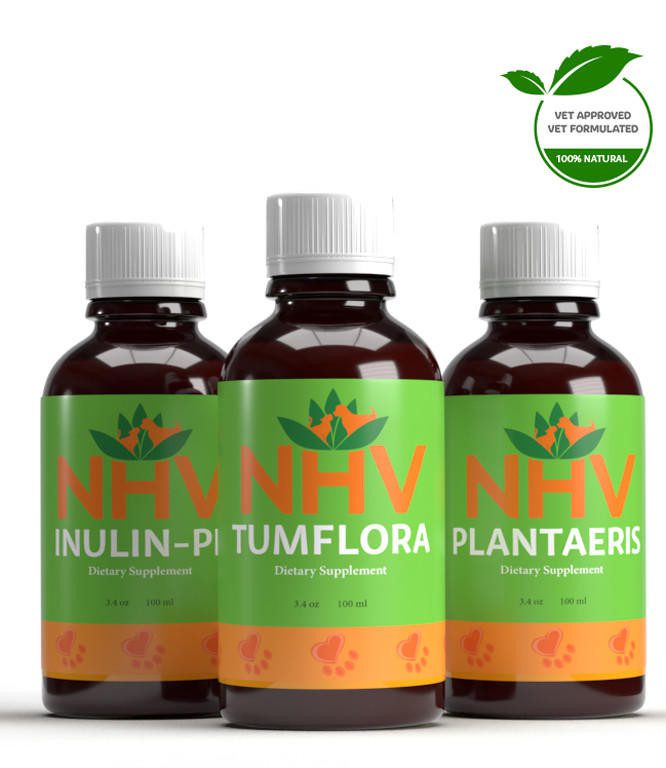
Parasite Cleanser and Diarrhea Relief
bundle and save with pet expert kits
3 month supply for a small to medium size pet
Inflammatory bowel disease in dogs and cats (IBD) can be caused by a variety of reasons, including a parasitic or bacterial infection. Our Pet Experts have put together a comprehensive IBD support bundle, which includes natural support for overall gastrointestinal care, a gentle parasite aid, and effective natural help for diarrhea in pets.


Inflammatory bowel disease in dogs and cats (IBD) can be caused by a variety of reasons, including a parasitic or bacterial infection. Our Pet Experts have put together a comprehensive IBD support bundle, which includes natural support for overall gastrointestinal care, a gentle parasite aid, and effective natural help for diarrhea in pets.

Inflammatory Bowel Disease in dogs and cats happens when the GI tract is in a constant state of inflammation and irritation. This can damage the digestive tract and prevent your IBD dog or cat’s body from absorbing nutrients. Common symptoms of IBD in cats and dogs include vomiting, diarrhea, and weight loss. The exact reason of inflammatory bowel disease in dogs and cats is unknown, but it may be due to genetic abnormalities, food allergies, parasites and autoimmune disorders. Cats and dogs who have been infected with giardia may also develop inflammation in the intestinal tract.
Whatever the reason your pet is suffering from IBD, the NHV IBD comfort kit can help ease their symptoms and begin healing. The NHV Inflammatory Bowel Disease Comfort Kit helps soothe IBD in Dogs and Cats through aiding in a variety of ways:
Benefits of Inulin PK
Feeding your pet Inulin-PK helps remove any parasites, and also contains anti-inflammatory herbs that help with their digestion.
Benefits of Plantaeris
Feeding Plantaeris will help your pet with diarrhea. It also has herbs like chamomile that have been used as a digestive tonic for centuries. Plantaeris can be used long-term to help heal the gut.
Benefits of TumFlora
Feeding TumFlora will help balance the intestinal flora and offer comprehensive inflammatory bowel disease support
The experts at NHV recommend that pets with inflammatory bowel disease maintain consistent use of these supplements (every day, twice a day) to give your pet the best support for IBD. Each works quickly and gently to remedy your pet’s symptoms and improve their quality of life.
Effective on the Causes of IBD
Supplements by NHV work in tandem with any conventional medical treatment to help bring about the best results for your pet. The powerful, natural ingredients that make up Inulin-PK and Plantaeris and TumFlora were selected for their effective and complementary properties.
Feed your pet these powerful supplements as part of a comprehensive plan to address the common underlying causes of IBD and help them feel better.
Top-Quality Support for Your Pet
Your pet deserves the best. NHV supplements are all human-grade. We make them in a GMP-certified and FDA-approved facility. All ingredients are organic or ethically wildcrafted and we use non-GMO vegetable glycerin as a base.
If you’re looking to support a pet with inflammatory bowel disease or irritable bowel syndrome, add these supplements to their care plan. We can’t wait to see your pet feeling well again.
Select your pet's weight to determine the correct dose.
To be taken twice daily. Determine your pet’s weight and then use the easy chart below to determine the correct dose. This is the minimum dosage.
Pet's Weight Dosage
0 - 15 lb = 0.5 ml
16 - 30 lb = 1.0 ml
31 - 45 lb = 1.5 ml
46 - 60 lb = 2.0 ml
61 - 75 lb = 2.5 ml
Over 75 lb = 3.0 ml
For small animals (rabbits, ferrets), avians and reptiles use 1 drop for every 2 lb of body weight.
How to Administer
Shake well before use. The easiest method is to use the dropper provided and place the drops into your pet’s food or favorite treat. You can also use the dropper and squirt directly into the pet’s mouth. Some pets can be finicky, if this occurs consider hiding the drops in foods most pet’s love such as fish, chicken or yogurt or a favorite treat. If your pet only eats dry food then soak a few kibbles at feeding time.
For Best Results
Herbal dietary supplements are beneficial to the health and well-being of your pet and are safe for long-term use. Every pet responds to natural herbal supplements differently, therefore it is important to be consistent and administer the product daily. Supplements generally take two to four weeks to take effect, however this will vary from one animal to the next.
Product Storage
All NHV Natural Pet Products are pure herbal extracts and contain no artificial additives, preservatives or coloring. Shelf life after opening is 6 months and must be refrigerated after opening.
Cautions and Contraindications
Do not use in pregnant or nursing animals.
All information provided by NHV Natural Pet Products is for educational purposes only.
Inflammatory Bowel Disease in dogs and cats happens when the GI tract is in a constant state of inflammation and irritation. This can damage the digestive tract and prevent your IBD dog or cat’s body from absorbing nutrients. Common symptoms of IBD in cats and dogs include vomiting, diarrhea, and weight loss. The exact reason of inflammatory bowel disease in dogs and cats is unknown, but it may be due to genetic abnormalities, food allergies, parasites and autoimmune disorders. Cats and dogs who have been infected with giardia may also develop inflammation in the intestinal tract.
Whatever the reason your pet is suffering from IBD, the NHV IBD comfort kit can help ease their symptoms and begin healing. The NHV Inflammatory Bowel Disease Comfort Kit helps soothe IBD in Dogs and Cats through aiding in a variety of ways:
Benefits of Inulin PK
Feeding your pet Inulin-PK helps remove any parasites, and also contains anti-inflammatory herbs that help with their digestion.
Benefits of Plantaeris
Feeding Plantaeris will help your pet with diarrhea. It also has herbs like chamomile that have been used as a digestive tonic for centuries. Plantaeris can be used long-term to help heal the gut.
Benefits of TumFlora
Feeding TumFlora will help balance the intestinal flora and offer comprehensive inflammatory bowel disease support
The experts at NHV recommend that pets with inflammatory bowel disease maintain consistent use of these supplements (every day, twice a day) to give your pet the best support for IBD. Each works quickly and gently to remedy your pet’s symptoms and improve their quality of life.
Effective on the Causes of IBD
Supplements by NHV work in tandem with any conventional medical treatment to help bring about the best results for your pet. The powerful, natural ingredients that make up Inulin-PK and Plantaeris and TumFlora were selected for their effective and complementary properties.
Feed your pet these powerful supplements as part of a comprehensive plan to address the common underlying causes of IBD and help them feel better.
Top-Quality Support for Your Pet
Your pet deserves the best. NHV supplements are all human-grade. We make them in a GMP-certified and FDA-approved facility. All ingredients are organic or ethically wildcrafted and we use non-GMO vegetable glycerin as a base.
If you’re looking to support a pet with inflammatory bowel disease or irritable bowel syndrome, add these supplements to their care plan. We can’t wait to see your pet feeling well again.
Select your pet's weight to determine the correct dose.
To be taken twice daily. Determine your pet’s weight and then use the easy chart below to determine the correct dose. This is the minimum dosage.
Pet's Weight Dosage
0 - 15 lb = 0.5 ml
16 - 30 lb = 1.0 ml
31 - 45 lb = 1.5 ml
46 - 60 lb = 2.0 ml
61 - 75 lb = 2.5 ml
Over 75 lb = 3.0 ml
For small animals (rabbits, ferrets), avians and reptiles use 1 drop for every 2 lb of body weight.
How to Administer
Shake well before use. The easiest method is to use the dropper provided and place the drops into your pet’s food or favorite treat. You can also use the dropper and squirt directly into the pet’s mouth. Some pets can be finicky, if this occurs consider hiding the drops in foods most pet’s love such as fish, chicken or yogurt or a favorite treat. If your pet only eats dry food then soak a few kibbles at feeding time.
For Best Results
Herbal dietary supplements are beneficial to the health and well-being of your pet and are safe for long-term use. Every pet responds to natural herbal supplements differently, therefore it is important to be consistent and administer the product daily. Supplements generally take two to four weeks to take effect, however this will vary from one animal to the next.
Product Storage
All NHV Natural Pet Products are pure herbal extracts and contain no artificial additives, preservatives or coloring. Shelf life after opening is 6 months and must be refrigerated after opening.
Cautions and Contraindications
Do not use in pregnant or nursing animals.
All information provided by NHV Natural Pet Products is for educational purposes only.
immune support
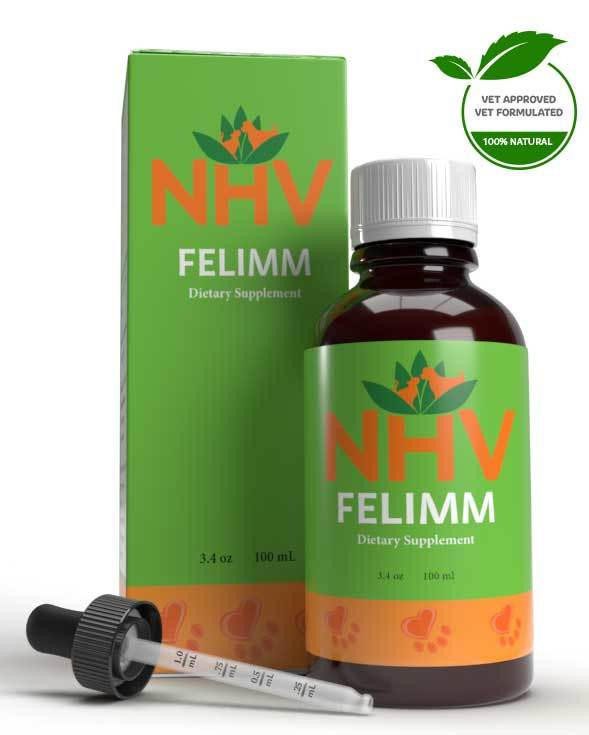
Helps your pet fight Feline Leukemia, FIV virus,other viral infections, and lymphoma
buy 2 and save $3
3 month supply for a small to medium size pet.

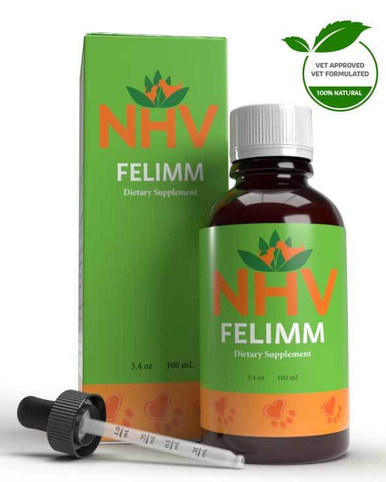

FeLV and FIV have a strong negative impact on your cat’s immune system and general wellbeing. Left untreated, FeLV can cause serious health issues and other cancers, including lymphoma. Add this natural support to the symptomatic treatment for feline leukemia and FIV that your vet recommends along with diet and nutrition to give them the best fighting chance.
It’s important to help balance your cat’s immune system to help them defend against daily contact with environmental bacteria, fungi, viruses, and protozoa.
NHV’s all-natural supplements for feline leukemia and FIV are formulated by a master herbalist, and a holistic veterinarian with over 20 years of experience.
Felimm for cats contains powerful herbal ingredients that help in fighting viruses and balancing your kitty’s natural immune system.
Add this natural support to the treatment for feline leukemia recommended by your veterinarian. Read more about leukemia and FIV on the holistic veterinarian, Dr. Hillary Cook’s blog.
With the right support cats with FeLV and FIV can lead healthy lives.
NHV offers a Feline Leukemia (FeLV) Kit which is available in both a fighter pack and immune and antioxidant support pack. We also provide a Feline Immunodeficiency Virus (FIV) Kit because, at NHV, we believe in giving our pet parents everything they need to care for their kitty naturally.
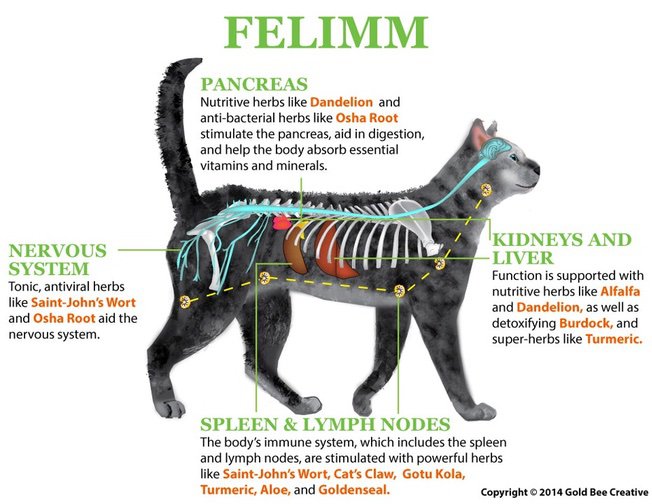
St. John’s Wort – A potent antiviral that helps control viral infections and stimulates your cat’s immune system.
Turmeric – A powerful antioxidant that helps fight the damaging effects of free radicals. It strengthens liver function and contains strong antifungal properties.
Aloe Vera – Contains Acemannan, which has been proposed as an adjunctive therapy for cats with FIV. Aloe also contains high levels of vitamins, minerals, amino acids, and other nutrients important for cats with immune disorders.
Alfalfa – Contains high levels of chlorophyll, which works as an antioxidant in your cat's bloodstream. It also contains nutrients beneficial to cats with immune disorders.
Burdock – Helps cleanse the body of toxins and waste that accumulate during illness. It is also high in calcium, phosphorus, iron, thiamine, and riboflavin.
Cat’s Claw – A powerful anti-inflammatory and antioxidant that supports your cat’s immune system and helps strengthen its defenses against viruses like leukemia.
Osha – A natural immune builder that helps pets fight infections including FeLV and FIV. Also has antibacterial and antiviral properties.
Dandelion – A highly nutritious food that stimulates liver secretion, improves digestion and stimulates appetite. It also protects the kidneys and has anti-inflammatory properties.
Gotu Kola– An antioxidant-rich herb known to strengthen the immune system and protect cells from damage caused by free radicals. Helps calm the nervous system.
Usnea – An immune system stimulant with anti-bacterial and anti-fungal properties that help protect your cat’s weakened immune system from Candida Albicans.
Goldenseal – An immune supporting herb with blood cleansing properties.
Myrrh – Helps control bacterial infections that cats with compromised immune systems are so vulnerable to.
Select your pet's weight to determine the correct dose.
To be taken twice daily. Determine your pet’s weight and then use the easy chart below to determine the correct dose. This is the minimum dosage.
Pet's Weight Dosage
0 - 15 lb = 0.5 ml
16 - 30 lb = 1.0 ml
31 - 45 lb = 1.5 ml
46 - 60 lb = 2.0 ml
61 - 75 lb = 2.5 ml
Over 75 lb = 3.0 ml
How to Administer
Shake well before use. The easiest method is to use the dropper provided and place the drops into your pet’s food or favorite treat. You can also use the dropper and squirt directly into the pet’s mouth. Some pets can be finicky, if this occurs consider hiding the drops in foods most pet’s love such as fish, chicken or yogurt or a favourite treat. If your pet only eats dry food then soak a few kibbles at feeding time.
For Best Results
Herbal dietary supplements are beneficial to the health and well-being of your pet and are safe for long-term use. Every pet responds to natural herbal supplements differently, therefore it is important to be consistent and administer the product daily. Supplements generally take two to four weeks to take effect, however this will vary from one animal to the next.
Product Storage
All NHV Natural Pet Products are pure herbal extracts and contain no artificial additives, preservatives or coloring. Shelf life after opening is 6 months and must be refrigerated after opening.
Cautions and Contraindications
Do not use Felimm in pregnant or nursing animals. Speak to your vet before using our products. A second visit is recommended if your pet’s condition does not improve, or deteriorates after continued use of the supplements.
All information provided by NHV Natural Pet Products is for educational purposes only.
FeLV and FIV have a strong negative impact on your cat’s immune system and general wellbeing. Left untreated, FeLV can cause serious health issues and other cancers, including lymphoma. Add this natural support to the symptomatic treatment for feline leukemia and FIV that your vet recommends along with diet and nutrition to give them the best fighting chance.
It’s important to help balance your cat’s immune system to help them defend against daily contact with environmental bacteria, fungi, viruses, and protozoa.
NHV’s all-natural supplements for feline leukemia and FIV are formulated by a master herbalist, and a holistic veterinarian with over 20 years of experience.
Felimm for cats contains powerful herbal ingredients that help in fighting viruses and balancing your kitty’s natural immune system.
Add this natural support to the treatment for feline leukemia recommended by your veterinarian. Read more about leukemia and FIV on the holistic veterinarian, Dr. Hillary Cook’s blog.
With the right support cats with FeLV and FIV can lead healthy lives.
NHV offers a Feline Leukemia (FeLV) Kit which is available in both a fighter pack and immune and antioxidant support pack. We also provide a Feline Immunodeficiency Virus (FIV) Kit because, at NHV, we believe in giving our pet parents everything they need to care for their kitty naturally.

St. John’s Wort – A potent antiviral that helps control viral infections and stimulates your cat’s immune system.
Turmeric – A powerful antioxidant that helps fight the damaging effects of free radicals. It strengthens liver function and contains strong antifungal properties.
Aloe Vera – Contains Acemannan, which has been proposed as an adjunctive therapy for cats with FIV. Aloe also contains high levels of vitamins, minerals, amino acids, and other nutrients important for cats with immune disorders.
Alfalfa – Contains high levels of chlorophyll, which works as an antioxidant in your cat's bloodstream. It also contains nutrients beneficial to cats with immune disorders.
Burdock – Helps cleanse the body of toxins and waste that accumulate during illness. It is also high in calcium, phosphorus, iron, thiamine, and riboflavin.
Cat’s Claw – A powerful anti-inflammatory and antioxidant that supports your cat’s immune system and helps strengthen its defenses against viruses like leukemia.
Osha – A natural immune builder that helps pets fight infections including FeLV and FIV. Also has antibacterial and antiviral properties.
Dandelion – A highly nutritious food that stimulates liver secretion, improves digestion and stimulates appetite. It also protects the kidneys and has anti-inflammatory properties.
Gotu Kola– An antioxidant-rich herb known to strengthen the immune system and protect cells from damage caused by free radicals. Helps calm the nervous system.
Usnea – An immune system stimulant with anti-bacterial and anti-fungal properties that help protect your cat’s weakened immune system from Candida Albicans.
Goldenseal – An immune supporting herb with blood cleansing properties.
Myrrh – Helps control bacterial infections that cats with compromised immune systems are so vulnerable to.
Select your pet's weight to determine the correct dose.
To be taken twice daily. Determine your pet’s weight and then use the easy chart below to determine the correct dose. This is the minimum dosage.
Pet's Weight Dosage
0 - 15 lb = 0.5 ml
16 - 30 lb = 1.0 ml
31 - 45 lb = 1.5 ml
46 - 60 lb = 2.0 ml
61 - 75 lb = 2.5 ml
Over 75 lb = 3.0 ml
How to Administer
Shake well before use. The easiest method is to use the dropper provided and place the drops into your pet’s food or favorite treat. You can also use the dropper and squirt directly into the pet’s mouth. Some pets can be finicky, if this occurs consider hiding the drops in foods most pet’s love such as fish, chicken or yogurt or a favourite treat. If your pet only eats dry food then soak a few kibbles at feeding time.
For Best Results
Herbal dietary supplements are beneficial to the health and well-being of your pet and are safe for long-term use. Every pet responds to natural herbal supplements differently, therefore it is important to be consistent and administer the product daily. Supplements generally take two to four weeks to take effect, however this will vary from one animal to the next.
Product Storage
All NHV Natural Pet Products are pure herbal extracts and contain no artificial additives, preservatives or coloring. Shelf life after opening is 6 months and must be refrigerated after opening.
Cautions and Contraindications
Do not use Felimm in pregnant or nursing animals. Speak to your vet before using our products. A second visit is recommended if your pet’s condition does not improve, or deteriorates after continued use of the supplements.
All information provided by NHV Natural Pet Products is for educational purposes only.
Published: November 16, 2022